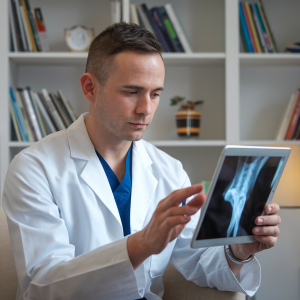Orthopedic injuries can change a person’s life in an instant. From a workplace accident to a car crash, these injuries often end up in legal claims. When that happens, expert insight is key. Orthopedic surgery expert witnesses play a unique role in these cases. They help explain complex injuries, treatment plans, and long-term outcomes. Their insights can shape the direction of a claim—especially when big decisions or compensation amounts are on the line.
Let’s explore how orthopedic surgery and expert witnesses work together in personal and workplace injury cases.

Understanding Orthopedic Surgery in Legal Contexts
What is Orthopedic Surgery?
Orthopedic surgery focuses on treating injuries and conditions that affect the musculoskeletal system. That includes bones, joints, ligaments, tendons, muscles, and nerves.
These surgeries aim to reduce pain, restore movement, and improve quality of life.
Common Conditions Treated
Orthopedic surgeons often treat:
- Broken bones (fractures)
- Dislocated joints
- Torn ligaments and tendons (like ACL tears)
- Nerve damage and compression
- Chronic joint pain from arthritis
- Spinal injuries
These conditions can be the result of both sudden trauma and long-term overuse.
Types of Orthopedic Procedures
Here are a few common types of orthopedic surgeries that might come up in legal claims:
Procedure Type | Purpose | Common Use Case |
Joint Replacement | Replace damaged joints (e.g., hips) | Severe arthritis or trauma |
Arthroscopy | Diagnose and treat joint problems | Sports injuries or joint damage |
Spinal Surgery | Stabilize or decompress spinal nerves | Back injuries from accidents |
Fracture Repair | Set and stabilize broken bones | Workplace or personal accidents |
Tendon Repair | Reattach torn tendons | Repetitive stress or trauma |
Importance in Injury-Related Legal Cases
In legal settings, orthopedic issues often form the foundation of a claim. They help determine the extent of harm and what recovery might look like.
Relevance to Workplace Injuries
Jobs that require lifting, repetitive motions, or standing for long periods can lead to orthopedic injuries. Some of the most common workplace-related issues include:
- Acute trauma – falls, machinery accidents, or dropped objects
- Repetitive motion disorders – carpal tunnel syndrome, rotator cuff injuries
- Overexertion injuries – sprains or strains from lifting or twisting
Orthopedic expert witnesses help clarify if the injury was caused by the job—and how it impacts someone’s ability to work.
Relevance to Personal Injury Claims
Personal injury cases often involve sudden accidents that result in orthopedic damage. These include:
- Car accidents – fractures, spinal injuries, joint dislocations
- Slip and fall incidents – broken hips, wrist fractures, torn ligaments
- Sports-related injuries – often relevant in youth and amateur leagues
In these claims, orthopedic experts can explain the severity of the injury, the healing timeline, and any long-term consequences.
The Role of an Orthopedic Surgery Expert Witness
Orthopedic surgery expert witnesses are often the bridge between medical facts and legal decisions. Their role is to explain the nature of injuries and treatments in a way that makes sense to judges, juries, and attorneys.
They don’t take sides—they give facts. And that can make or break a case.
Responsibilities in Legal Cases
An orthopedic expert doesn’t just show up in court and talk. Their work starts well before trial and often includes detailed evaluations and reports.
Objective Medical Evaluations
One of the expert’s key roles is to conduct or review medical evaluations. These can help answer questions like:
- Is the injury real?
- Was it caused by the incident in question?
- Is the injury temporary or permanent?
Independent Medical Exams (IMEs) are often requested in legal cases. These are unbiased assessments that look at the person’s current condition.
Causation analysis is another task. That means determining whether the accident or workplace activity truly caused the injury—or if something else might be responsible.
Expert Testimony in Court
When it’s time to testify, the expert witness steps into the courtroom. Their job here is to explain things clearly—without the medical jargon.
They may:
- Show scans or X-rays
- Walk the jury through what the injury means
- Explain why certain treatments were needed
- Dispute claims made by other medical professionals
Good expert witnesses help juries understand the impact of injuries—not just physically, but emotionally and financially too.
How Their Testimony Impacts a Case
Expert witnesses bring clarity to complex issues. Their testimony can change the entire direction of a claim.
Clarifying Extent of Injuries
They help identify:
- Permanent impairment – if the person will never fully recover
- Functional limitations – what tasks the person can or can’t do
- Need for future care – like surgery, therapy, or assistive devices
By painting a clear picture of the injury, they help all parties understand what the injured person is really facing.
Influencing Case Outcomes
Here’s how orthopedic expert testimony can influence outcomes:
Testimony Area | Legal Impact |
Severity of Injury | Can increase or reduce compensation amounts |
Treatment Justification | Validates the medical costs being claimed |
Work Limitations | Impacts decisions on disability benefits |
Cause of Injury | Supports or challenges liability claims |
Their input often plays a major role in settlement negotiations, trial decisions, and worker’s compensation rulings.

Choosing the Right Expert Witness for Your Case
Not all expert witnesses are created equal. Choosing the right orthopedic surgery expert can make a huge difference in your case.
The ideal expert doesn’t just have medical knowledge—they know how to explain that knowledge clearly in a legal setting.
Key Qualifications to Look For
When selecting an orthopedic surgery expert witness, there are two big categories to pay attention to: medical experience and legal experience.
Medical Experience and Board Certification
A strong expert witness should have:
- Years of clinical practice – preferably 10+ years treating patients
- Specialization in relevant areas – like spinal surgery, joint injuries, or trauma care
- Board certification – this shows they meet national standards in their specialty
- Current licensure – they should still be practicing or at least active in the medical field
These qualifications ensure that the expert really knows the subject inside and out.
Legal Experience and Testimonial History
Being a great doctor doesn’t automatically make someone a great expert witness. Legal experience matters too.
Look for someone who has:
- Testified in depositions and trials
- Written expert reports and IME evaluations
- Clear communication skills – they should be able to break down medical terms for non-medical people
- Credibility – judges and juries should find them trustworthy and unbiased
You can often request a CV or ask about previous legal cases they’ve worked on.
Questions to Ask Before Hiring
To help find the right fit, here are a few key questions:
Question | Why It Matters |
How many times have you testified in court? | Experience helps ensure strong courtroom presence |
Have you worked on similar injury cases? | Relevance to your case can boost credibility |
Are you comfortable explaining technical terms to a jury? | Good communication is crucial |
Do you have any conflicts of interest? | Ensures they can stay neutral and credible |
What’s your process for evaluations? | Helps understand how thorough and fair they are |
Asking the right questions upfront helps you find someone who’s not just qualified—but also effective.
Breaking It All Down
Orthopedic surgery expert witnesses play a powerful role in injury claims. Their insights help clarify what really happened, how serious the injury is, and what the future may look like for the injured person.
Whether it’s a workplace injury or a personal accident, having the right expert can bring confidence, clarity, and credibility to your case.
Frequently Asked Questions
What is an orthopedic surgery expert witness?
An orthopedic surgery expert witness is a medical professional who offers expert opinions in legal cases involving musculoskeletal injuries. They help explain how an injury happened, how serious it is, and what kind of treatment is needed.
When is an orthopedic expert witness needed in a legal case?
They’re often needed in personal injury or workplace injury claims where orthopedic injuries—like broken bones or spine issues—are central to the case. Their testimony can help prove the cause and impact of the injury.
Can an orthopedic expert witness impact the outcome of a claim?
Yes. Their opinions can influence settlement amounts, clarify long-term damage, and help the court understand the medical side of the case.
What should I look for in a good orthopedic expert witness?
Look for someone with years of clinical experience, board certification, and previous legal casework. They should also communicate clearly and remain neutral.
How much does it cost to hire an orthopedic expert witness?
Costs vary, but expert witnesses typically charge by the hour for case review, reports, depositions, and court appearances. It’s best to request a fee schedule upfront.
What is an Independent Medical Exam (IME)?
An IME is a neutral medical evaluation done by an expert to assess an injury. It’s often used in legal cases to verify claims made by either side.
Can an orthopedic expert testify for either side in a case?
Yes. They may be hired by either the plaintiff or the defense, but their duty is to provide objective, medically sound opinions.
Offsite Resources
- American Academy of Orthopaedic Surgeons (AAOS) – Offers trusted information on orthopedic conditions, procedures, and recovery.
👉 https://www.aaos.org - National Safety Council (NSC) – Helpful insights into workplace safety, injury prevention, and accident statistics.
👉 https://www.nsc.org - MedlinePlus – A health information service from the National Library of Medicine covering orthopedic injuries and treatments.
👉 https://medlineplus.gov - Occupational Safety and Health Administration (OSHA) – Key resource for understanding workplace injury standards and regulations.
👉 https://www.osha.gov - American Board of Independent Medical Examiners (ABIME) – Provides insight into certified medical evaluators and IME best practices.
👉 https://www.abime.org - FindLaw – A broad legal resource with explanations of personal injury law, expert witnesses, and workers’ compensation.
👉 https://www.findlaw.com - NOLO – Offers easy-to-understand legal guides for consumers dealing with personal injury and medical expert witness issues.
👉 https://www.nolo.com

What's Next?
If you need expert support for your legal case involving orthopedic injuries, MLPIME is here to help. Our team connects attorneys and insurance professionals with highly qualified medical expert witnesses—quickly and reliably. Call us today at 1-833-465-7463 to learn how we can support your case with trusted orthopedic expertise.
